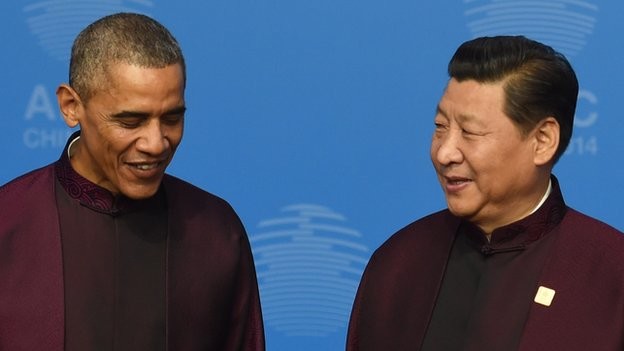Apec summit: China's Xi Jinping urges economic integration
Published on 11 november 2014He was speaking on day two of the Asia-Pacific Economic Co-operation (Apec) summit near Beijing.
Mr Xi's comments come amid differences between the US and China over what are being seen as competing trade plans.
But separately, the US and China have made a "breakthrough" on eliminating tariffs on their technology products.
US Trade Representative Michael Froman told reporters in Beijing that the deal could lead to the "swift conclusion" of wider talks on global cuts in technology tariffs.
This could lead to a drop in the price of products such as GPS devices, semi-conductors and medical equipment.
Mr Froman said the agreement in Beijing "shows how the US and China work together to both advance our bilateral economic agenda but also to support the multilateral trading system".
Anti-corruption
In his opening remarks on Tuesday, Mr Xi pushed for a trade liberalisation framework called the Free Trade Area of the Asia-Pacific (FTAAP).
"Currently, the global economic recovery still faces many unstable and uncertain factors," the Chinese leader said.
"Facing the new situation, we should further promote regional economic integration and create a pattern of opening up that is conducive to long-term development."
China is proposing a two-year study on the FTAAP plan which will be presented to the Apec leaders for approval.
However, some say it could distract from another wide-reaching trade agreement backed by the US called the Trans-Pacific Partnership (TPP) - which China is not part of.
Some Chinese commentators have said the TPP is a method to counter China's growing influence in the Asian region.
However, Mr Obama rejected this in an interview with China's Xinhua state news agency, saying the US was in no way trying to contain China.
US President Barack Obama (L) stands with Chinese President Xi Jinping as they pose for a photo as he arrives for the Asia-Pacific Economic Cooperation
Mr Xi spoke as Apec leaders met for roundtable talks, with discussion expected to centre on trade agreements and a regional anti-corruption initiative.
On Monday, the Japanese and Chinese leaders held talks for the first time on the sidelines of the summit.
Ties between the two Asian giants have been extremely tense because of a territorial row over disputed islands in the East China Sea.
MH17
On the sidelines of the summit, Australian PM Tony Abbott met Russian President Vladimir Putin to discuss the downing of the Malaysia Airlines plane in eastern Ukraine in July.
Australians were among the 298 people who died on Flight MH17. Western nations say it was caused by a missile fired by pro-Russian rebels. Moscow says Ukrainian government forces were responsible.
Kremlin spokesman Dimitri Peskov said the two leaders had agreed on the need for a genuine investigation into what happened.
In other developments:
- The US and China have agreed to grant visas valid for up to a decade to visitors between the two countries, up from a maximum of one year.
- Mr Obama, in the interview with Xinhua, said the US was willing to strengthen counter-terrorism co-operation with China
- China has pledged $10m (£6.3m) to support the Apec mechanism for capacity-building.
Source: BBCNews
Photo source: BBCNews, redpepper


